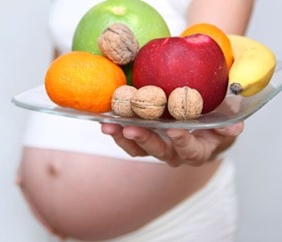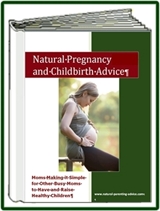Healthy Pregnancy Diet

Maintaining a healthy pregnancy diet is very important, not just for you but for your baby. Unlike the popular myth, baby doesn’t just take what it needs from mom. The nutrients in your bloodstream are most available to your baby.
When you are pregnant, it is especially important to avoid consuming toxins in your diet. For that reason, we recommend that you only eat organic food. You should also avoid all processed and packaged foods as they contain unhealthy chemicals, including MSG, a neurotoxin, often labeled as “natural flavors”.
Yes, that means that you really need to prepare your own food while you are pregnant to be sure you are getting the best possible nutrition with no harmful chemicals. Don't despair though, cooking doesn't need to be hard. Check out 500 Low-Carb Recipes That the Whole Family Will Love.
for lots of simple yet healthy recipes that are low in carbohydrates and will not put you at risk for gestational diabetes. Just be sure to use organic fruits and vegetables as well as free-range meats and wild-caught salmon and prawns. Also, avoid any of the artificial sweeteners by either eliminating them or using stevia. This book allows us to cook a healthy dinner despite getting home from work later than we would like at times.
Get all of our best pregnancy tips. Download our free e-guide today!
Protein
One of the most important components of a healthy pregnancy diet is to eat 80-100 grams of complete protein per day. Protein provides amino acids which are the building blocks of the body. Protein is particularly important for the development of healthy bones, teeth and muscles.
You should plan to have at least one protein food and one healthy fat at every meal. This is important to stabilize your blood sugar as well as to make sure you get enough protein. Good sources of protein include organic free-range chicken, organic grass fed beef, organic grass fed lamb, organic pork.
Milk is a wonderful source of protein, calcium and other essential vitamins and minerals. Milk is an important part of a healthy pregnancy diet because it is critical for your baby’s bone development, muscle growth, and nerve development. Your best bet it to consume at least thirty two ounces (1 quart) of raw milk per day. If you can’t obtain raw milk, drink non homogenized whole milk. If you are thinking that we are out of our minds to be recommending RAW milk, check out A Campaign for Real Milk to see why. For an extra boost to your immune system and digestion, drink raw kefir or eat whole milk organic yogurt in addition to drinking milk.
You should also consume two free-range, organic eggs and two extra egg yolks every day as part of your healthy pregnancy diet. Egg yolks are full of lutein and vitamin A which are great for baby’s eyes as well as cholesterol and choline which are critical for your baby’s brain development.
Need to Talk To Someone?
Do be very specific or personal questions you do not feel comfortable discussing in public forums? If so, please meet signing up for a 60 minute mentoring session.
Pregnancy & Childbirth Mentoring
You will be amazed at the Amount of information and can gain confidence in just a few minutes of one-on-one help.
Carbohydrates – Vital Veggies, Soaked Grains and Vitamin C Rich Fruits & Berries
Fresh, organic green leafy vegetables are rich in the vitamins and minerals necessary to help your body use the protein in other foods. The darker the green, the higher the concentration of vitamins and minerals. Green vegetables are essential for getting the folic acid and iron you need. Iron in particular plays a critical role in the formation of red blood cells. When you realize your blood supply will increase by fifty percent while you are pregnant, you can see how important iron is as part of your healthy pregnancy diet. Make sure to eat between two and four servings of green vegetables every day.
Whole grains are a good source of the B vitamins that are necessary for the growth and functioning of nerve tissue. Be cautious with grains because they need to be prepared properly to ensure proper digestion.
Grains should be soaked in water overnight at room temperature with either a couple tablespoons of yogurt or lemon juice to break down the phytic acid and make them more digestible.
Sprouting is another way to remove the anti-nutrients and enzyme inhibitors to improve digestibility.
For more information why careful preparation of grains is necessary read Be Kind to Your Grains...And Your Grains Will Be Kind To You by Sally Fallon and Mary G. Enig, PhD.
Make sure to eat grains with a healthy fat source (like butter) as part of your healthy pregnancy diet to improve the release of minerals as well as slow down digestion. Refined grains (like white flour) can cause a spike in blood sugar that is equal to eating pure sugar. Avoiding blood sugar spikes is key to preventing pregnancy related blood sugar problems.
Read Gestational Diabetes Blood Sugar Levels for great tips for avoiding being diagnosed with Gestational Diabetes.Most cereals are processed at high temperatures, denaturing the grains they contain. Although cereal manufacturers add vitamins back in to compensate, these vitamins are often synthetic and are not easily absorbed by your body. Compounding the problem, pregnancy hormones slow digestion. The same hormones that soften our tissues in preparation for childbirth also cause our stomach and intestines to work less effectively. We recommend two servings of soaked or sprouted whole grains per day.
Try to consume a serving or two of whole, organic citrus fruit every day. Kiwi fruit and Strawberries are also great sources of Vitamin C. Vitamin C is important for your body’s manufacture of collagen, the substance that holds your tissues together. Vitamin C is essential for strengthening your uterus so that it performs well in labor. Vitamin C is also critical for increasing iron absorption as well as boosting your body’s defenses against infection. As part of your healthy pregnancy diet, always eat whole, organic fruit, not fruit juices. The fiber present in the whole fruit is essential to slowing the digestion of the fructose, preventing nasty spikes in your blood sugar levels. Besides, with your digestive system working sluggishly already due to pregnancy hormones, you need all the fiber you can get to keep things moving along! We recommend one to two servings of citrus or other high vitamin C fruits and berries a day
Healthy Fats
Healthy fats and oils are essential for your body to absorb key fat-soluble vitamins like vitamins A, D, E and K. They also make your skin more stretchable, preventing stretch marks and preventing tearing during delivery.
Because fat will contain a higher toxin load than proteins and vegetables, it is essential to consume only organic sources of fat as part of your healthy pregnancy diet.
The best sources are organic butter from grass-fed cows, unrefined, organic coconut oil and cod liver oil.
Butter is great for cooking because it does not break down under high temperatures the way olive oil and other vegetables oils do. Coconut oil does well under high temperatures as well and is rich in lauric acid for your immune system.
We also recommend that everyone consume a serving of cod liver oil every day for the Omega 3 fats and because it is an excellent source of vitamin A and D in their whole food (read most digestible) form.
If you have been shying away from cod liver oil because of fears about Vitamin A, read Vitamin A for Fetal Development and The Vitamin A Saga .
Vitamin A Knavery is a great analysis of a recent studies that “proved” Vitamin A was dangerous. For more information about healthy fats read Know Your Fats . Be sure to eat at least four tablespoons of butter a day along with two tablespoons of coconut oil and teaspoon of cod liver oil.Yellow and Orange Colored Fruits and Vegetables
Yellow and orange colored fruits and vegetables are full of beta carotene which your body converts to vitamin A. As discussed previously, Vitamin A is known for its role in preventing infection. During pregnancy, when the pressure of the growing uterus on the bladder is constant, extra vitamin A helps to protect against bladder and kidney infections. Vitamin A is essential for the development of your baby’s organs, central nervous system, heart and respiratory systems. (reference: Maija H. Zale of the Department of Food Science and Human Nutrition, Michigan State University, published J Nutr. 2001;131:705-705)
We recommend you eat at least one serving of yellow or orange colored fruits and vegetables a day as part of your healthy pregnancy diet.
Salt
Salt is an essential nutrient. It is necessary to prevent hypovolemia, or too little blood circulating through your body and placenta, a condition caused by restricted salt intake. The more blood you have circulating, the more nutrients you baby receives. Too little salt in your diet can also cause leg cramps and fatigue. We recommend that you salt your food to taste with natural sea salt. Our favorite brand is Real Salt
because it has more than 60 naturally occurring trace minerals and is mined from an underground ancient sea bed. This means that the water evaporated and left the salt behind before modern pollution - providing you natural salt without additives, chemicals, or heat processing of any kind.
Water
Water is essential to staying hydrated and is a critical part of your healthy pregnancy diet. You need to drink plenty of water throughout your pregnancy to prevent headaches and to ensure adequate blood volumes. Did you know that water accounts for seventy-five percent of your baby’s total body weight at birth? Soft drinks, fruit juice and other sugar laden drinks are not recommended because they will cause rapid increases in your blood sugar. You should also avoid caffeine laden beverages as they can dehydrate you.
Please make sure to drink filtered water as much as possible. Why? Because city water (tap water) is filled with contaminants and chemicals like chlorine, chloramine and flouride, all of which can negatively effect your baby's development. If you haven't already, install a reverse osmosis water filtration system under your sink. Reverse osmosis is the only filtration system that will remove both the chloramine and flouride. Our favorite reverse osmosis system is iSpring 75GPD 6-Stage Reverse Osmosis Alkaline Mineral Water Filter System
because it produces perfectly PH-balanced alkaline water and gives back healthy minerals for your body. Be sure to drink at least eight to ten glasses of filtered water (or spring water) per day.
Supplements
We don’t generally recommend a lot of supplements as part of a healthy pregnancy diet. Food in its whole form provides better nutrition and assimilation than supplements. However, it is important for you to take a good whole food pregnancy vitamin while you are pregnant. It should induce at least 600 mcg of Folate (Folic Acid in its whole food form) as part of your healthy pregnancy diet. Our favorite pregnancy vitamin is New Chapter Perfect Prenatal
because they use organic herbs and cultured whole-food vitamins and minerals.
The only other supplement that we recommend as part of your healthy pregnancy diet is fiber. Fiber is important to keep things moving along thru your pregnancy-induced-sluggish digestive system. Unfortunately, most fiber supplements are laden with either sugar or artificial sweeteners. You want to stay away from both while you are pregnant. Our favorite way to supplement fiber is to buy whole psyllum husks and add two to four tablespoons to a glass of water mixed with a package of Emergen-C
Start Preparing for Childbirth NOW
Learn what you don’t know!
Sign up for a Bradley Method of Childbirth Preparation Class – the best education for preparing your body as well as your birthing partner for childbirth. Bradley method classes also help you with labor pain management as well as with birth planning and evaluating all your options.
Take an online Childbirth Preparation Class. While we prefer in person childbirth classes, if you absolutely cannot squeeze one in then at least take an online class. Our favorite ONLINE class is Birth Outside the Box™
A Couple of Great Articles about What to Eat and Why
Diet for Pregnant and Nursing Mothers
Principles of Healthy Diets
More Information You Might Be Interested In
Read more about the Importance of a Healthy Diet, especially for unborn babies, children and nursing moms.
Worried about weight gain? Weight Gain in Pregnancy is a huge concern for many women. Here's what you need to know and your doctor is unlikely to tell you.
Childbirth can be an endurance event. Read about a few important Pregnancy Exercises you should be doing to prepare your body for your baby's birth.
See some Healthy Crock Pot Recipes that can make meal preparation easy.
Visit our Natural Pregnancy Forum to read stories and ask questions of the community.










New! Facebook Comments
Tell us what you think!